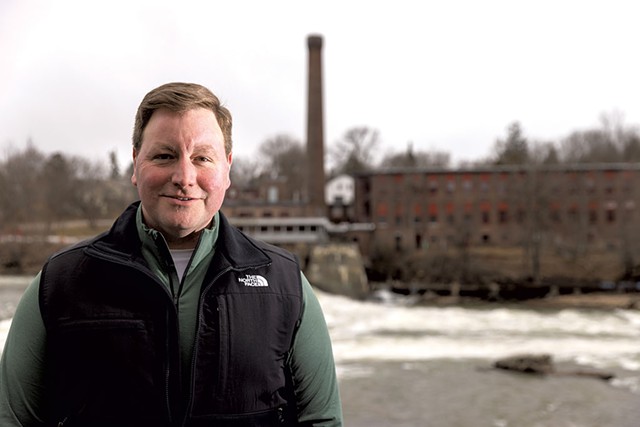
- James Buck
- Mike Pieciak
Mike Pieciak has been such a prominent part of Vermont's pandemic response that it would be easy to forget he has a day job.
Beyond his regular COVID-19 data presentations — a central feature of Gov. Phil Scott's televised pandemic press briefings — Pieciak also runs the state's sprawling Department of Financial Regulation. The department plays an important but largely unseen role in the financial well-being of Vermonters by ensuring that banking and insurance companies follow state laws and make good on their promises to consumers. Under Pieciak's six-year leadership, the DFR has recouped about $13 million from settlements or restitution from companies and individuals who've run afoul of Vermont law.
With the state now entering what many hope will be a new, less disruptive phase of the pandemic, Pieciak is starting to refocus on his behind-the-scenes money responsibilities.
"For the first time in two years, the majority of my time has been spent on DFR work," he said last week. "Which is great, because these are the items that I think are impactful."
Pieciak (pronounced P-check), a licensed attorney, oversees roughly 100 staffers tasked with regulating hundreds of local, national and international companies that do business in Vermont across the banking and insurance industries. As a Democratic holdover from the administration of former governor Peter Shumlin now serving under a Republican, 38-year-old Pieciak says he views his role as apolitical.
"We are a consumer-driven organization," he said, describing the department's mission as "making sure Vermonters' financial health is strong and that companies are treating them fairly."
One of the items most urgently jockeying for the commissioner's attention is the fast-evolving but lightly regulated world of cryptocurrency. In 2020, Vermonters made 224,000 crypto transactions worth $83.7 million — more than five times the previous year's sum.
Pieciak's department recently spearheaded an investigation into a firm called BlockFi, which offers what amounts to a crypto version of a savings account promising an unusually high interest rate of up to 9 percent.
When BlockFi applied for a state banking license, one of Pieciak's employees realized that the company was, in effect, offering a security product without registering it as one. The agency called other states' regulators and brought the matter to the attention of the U.S. Securities and Exchange Commission. That led to a landmark settlement that called for crypto lending services to register as securities and comply with associated regulations. The $100 million federal settlement called for a $1 million payout to every state, including Vermont.
Pieciak is also focusing heavily on cybersecurity. The month-old war in Ukraine has placed financial institutions around the world on alert for possible cyberattacks by Russia. His department has been checking in with Vermont entities under its watch to make sure they are "up to the task."
The bulk of the department's work doesn't tend to generate headlines, however. An average day can find staff reviewing registration applications from investment advisers, investigating consumer complaints about an insurance company or inspecting one of Vermont's six state-chartered banks to ensure that they are financially sound.
Pieciak's work has won praise even from representatives of the industries that his department regulates.
"He is very open-minded," said Chris D'Elia, president and treasurer of the Vermont Bankers Association, who served in former governor Howard Dean's administration. "He's enjoyable to work with. That cannot be said of other regulators in our industry down in Washington."
Rich Smith, the recently retired president of the Vermont Captive Insurance Association, cited Pieciak's ability to quickly make sense of complicated matters. "He can take something really complex and describe it to others in a way that we mere mortals can understand," Smith said.
Vermont lawmakers who deal directly with Pieciak's department seem to agree. Kitty Toll, a former state representative who chaired the House Appropriations Committee until last year, said her colleagues often commented after Pieciak testified before them that they had a full understanding of the work he was doing.
"You had confidence in his testimony," Toll said. "You felt it was truthful and accurate."
Toll said that same approach helped Pieciak win over the broader public during COVID-19. "When people were so anxious and there were so many unknowns during the pandemic, he brought a voice of reason and calmness."
Pieciak was born and raised in Brattleboro, then completed his undergraduate studies at Union College in Schenectady, N.Y., where he also played on the football team. He graduated from the University of Miami School of Law and spent five years working for law firms in Vermont and New York City.
He was recruited to the Shumlin administration in early 2014 by then-finance commissioner Susan Donegan, who had heard he was interested in government work and wanted to return to Vermont. Not long after starting his gig as a deputy finance commissioner, Pieciak began looking into what proved to be one of the biggest financial frauds in Vermont history — the EB-5 scandal.
He would eventually help uncover the full extent of the development scheme and produce the complex "spaghetti map" that showed how the fraudsters misappropriated investment funds meant to build projects in northeastern Vermont. A federal judge later cited the chart in a ruling against the fraud's mastermind, Ariel Quiros.
Pieciak and other state officials have since faced questions about why they allowed the fraudsters to continue raising money for several months after they had referred the case to the Federal Bureau of Investigation. In an interview with Vermont Public Radio last year, Pieciak said he was "not in favor" of allowing the operators to continue collecting from investors but that it wasn't his "call at the end of the day."
Pieciak credits his interest in public service — and his spirit of collaboration — to his parents. He grew up in a politically divided household: His father, who is a partner at a small accounting business, is a Republican, while his mother, who volunteers at a local food pantry and soup kitchen she founded four decades ago, is a Democrat. He recalls them competing for his political loyalties during the 1988 presidential campaign, when he was just 5 years old.
"They would ... say: 'You like George Bush Sr., don't you?' 'You like Michael Dukakis — he has the same first name as you,'" Pieciak said. "Bipartisanship was in my DNA."
Pieciak, who now lives in Winooski with his partner, eventually gravitated toward his mother's politics but jokes that he has worked for both of his parents during his time in state government: first serving Shumlin and then Scott, who was elected in 2016.
Since then, Pieciak has become something of a Swiss Army knife for the Republican governor. When the administration needed a representative on the legislative pension task force formed last summer, Pieciak was the guy. And when the Agency of Human Services launched an investigation into long wait times for medical care in Vermont a few months later, Pieciak and his DFR staff pitched in.
But his most visible — and perhaps surprising — role has been as part of the pandemic response.
Pieciak said he was summoned to meet with fellow cabinet members in early March 2020, expecting that Scott wanted to discuss health insurance matters related to who would pay for COVID-19 testing and hospital stays.
But he was met with a bigger request: Someone was needed to create forecasting models of the spread of the virus to determine whether the state had enough ventilators, hospital beds and health care personnel. Scott turned to Pieciak. He in turn tapped members of his staff with skills that could be applied to predicting the ebbs and flows of a public health threat, and he connected with national experts, too. The finance commissioner regularly offered data presentations during Scott's COVID-19 press briefings over the next two years.
"We knew, without a playbook, that modeling and data would be essential in charting our course," Scott said in a written statement to Seven Days. "I realize putting the Commissioner of Financial Regulation in charge of this wouldn't necessarily be the first choice for most. But I knew Mike was the perfect person, who had the necessary skillset and talent to do the job and do it well."
Betsy Bishop, president of the Vermont Chamber of Commerce, recalled that businesses would come to a halt around 11 a.m. during the early days of the pandemic so that their owners could tune in to the governor's press conferences — and specifically to Pieciak's updates. It was no small matter that Pieciak was the one who updated the state's temporary travel map, which had a direct impact on tourism.
"Before COVID, I'm not sure many people would have been able to pick Commissioner Pieciak out of a lineup," Bishop said. "But as he became the 'data guy,' people started not only to recognize him but started looking forward to his presentations."
Pieciak's insights were in such high demand that Bishop's organization invited him and Health Commissioner Mark Levine to its annual retreat in January 2021 so that business owners could quiz the two officials directly.
Ahead of the virtual event, the chamber printed hundreds of stickers displaying pictures of the two men, labeled "Levine & Pieciak Fan Club." Bishop later joked that the two could repurpose the stickers as campaign material for a joint ticket if Scott decided not to run again this year. (The governor has yet to announce his plans.)
Pieciak says he isn't sure where the future will take him. He says he wants to remain in public service and muses that elected office would pose an "appealing" opportunity. But he said he isn't ready to hit any campaign trail, noting it would be a "big leap" to go from his job to, say, the governor's office.
Pieciak said he has more than enough to keep him busy, from the rapidly shifting challenges presented by cryptocurrency and cybersecurity to other demands on his multifaceted finance department.
"That's really what's kept me here for so long," he said. "That mixture of business and financial services, enforcement and policy, all coming together in a unique way."
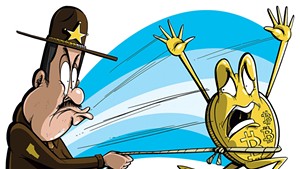
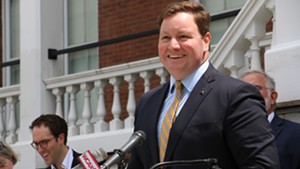
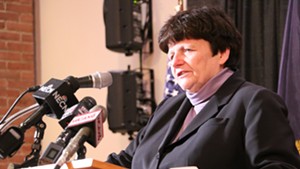

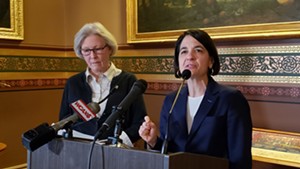









Comments
Comments are closed.
From 2014-2020, Seven Days allowed readers to comment on all stories posted on our website. While we've appreciated the suggestions and insights, right now Seven Days is prioritizing our core mission — producing high-quality, responsible local journalism — over moderating online debates between readers.
To criticize, correct or praise our reporting, please send us a letter to the editor or send us a tip. We’ll check it out and report the results.
Online comments may return when we have better tech tools for managing them. Thanks for reading.